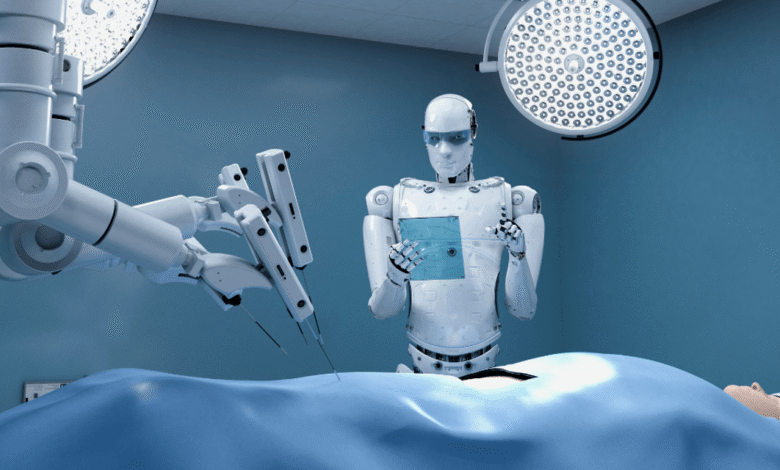
In recent years, the integration of artificial intelligence (AI) into healthcare has revolutionized the field, particularly in diagnostics and treatment. Healthcare AI refers to the utilization of machine learning algorithms and data analytics to streamline processes, enhance decision-making, and ultimately improve patient outcomes.
Read More: Beyond the Hype: The Realities of AI in Business
Introduction to Healthcare AI

What is Healthcare AI?
Healthcare AI encompasses a broad range of technologies and applications aimed at leveraging data-driven insights and automation to support healthcare delivery. These technologies include machine learning algorithms, natural language processing, robotics, and predictive analytics, among others.
Importance of AI in Healthcare
The adoption of AI in healthcare holds immense promise for addressing longstanding challenges such as diagnostic errors, treatment variability, and rising healthcare costs. By harnessing the power of AI, healthcare providers can make more accurate diagnoses, personalize treatment plans, and improve patient outcomes.
AI in Diagnostics
One of the primary applications of AI in healthcare is in diagnostics. AI algorithms can analyze medical imaging, laboratory tests, and patient data to assist healthcare professionals in identifying diseases and conditions accurately and efficiently.
Role of AI in Diagnosing Diseases
AI technologies have demonstrated remarkable accuracy in interpreting medical images such as X-rays, MRI scans, and mammograms. These algorithms can detect subtle abnormalities and patterns indicative of various diseases, enabling earlier detection and intervention.
Examples of AI Applications in Diagnostics
Examples of AI applications in diagnostics include computer-aided detection systems for identifying cancerous lesions in radiology images, AI-powered pathology tools for analyzing tissue samples, and algorithms for predicting disease progression based on patient data.
AI in Treatment
AI plays a crucial role in treatment processes by providing personalized treatment plans, predicting patient responses to medications, and optimizing treatment regimens.
How AI Aids in Treatment
By analyzing vast amounts of patient data, AI algorithms can identify patterns and correlations that may not be apparent to human healthcare providers. This enables the development of targeted treatment approaches tailored to individual patient characteristics and preferences.
Advancements in AI-Assisted Treatments
Advancements in AI-assisted treatments include the use of predictive analytics to identify patients at risk of complications, the development of virtual patient monitoring systems to track treatment adherence and progress remotely, and the integration of AI-powered decision support tools into electronic health records to assist clinicians in making evidence-based treatment decisions.
Benefits of Healthcare AI
The adoption of healthcare AI offers numerous benefits, including enhanced accuracy, efficiency, and patient outcomes.
Improved Accuracy and Efficiency
AI algorithms can analyze data at a much faster rate than humans, leading to quicker diagnosis and treatment decisions. Moreover, AI systems can learn from vast datasets, continually improving their performance and diagnostic accuracy over time.
Enhanced Patient Outcomes
By facilitating earlier detection, personalized treatment planning, and proactive interventions, healthcare AI has the potential to improve patient outcomes, reduce hospital readmissions, and enhance the quality of life for patients with chronic conditions.
Challenges and Concerns
Despite the promise of healthcare AI, several challenges and concerns remain.
Ethical Considerations
Ethical considerations, such as the responsible use of patient data and the potential for algorithmic bias, must be addressed to ensure equitable and unbiased healthcare delivery. Transparency, accountability, and patient consent are essential principles guiding the ethical development and deployment of AI technologies in healthcare.
Data Privacy and Security
Concerns regarding data privacy and security pose significant challenges to the widespread adoption of AI technologies in healthcare. Safeguarding sensitive patient information, ensuring compliance with regulatory requirements such as HIPAA, and mitigating cybersecurity risks are paramount to maintaining patient trust and confidence in AI-driven healthcare systems.
Future of Healthcare AI

The future of healthcare AI holds immense potential for further innovation and advancements.
Predictions and Possibilities
Predictive analytics, genomics, and remote monitoring are among the areas expected to benefit significantly from AI technologies. Predictive models can help identify individuals at risk of developing certain conditions, enabling proactive interventions and personalized preventive care. Genomic sequencing combined with AI-driven insights can inform precision medicine approaches tailored to individual genetic profiles. Remote monitoring technologies powered by AI enable continuous patient monitoring outside traditional healthcare settings, facilitating early detection of health issues and timely interventions.
Areas for Further Development
Advancements in AI research and development continue to drive progress in healthcare. Areas for further development include the integration of AI with emerging technologies such as blockchain for secure health data exchange, the application of reinforcement learning algorithms for autonomous medical decision-making, and the development of AI-driven virtual assistants for patient education and support.
Case Studies
Real-world examples illustrate the transformative impact of healthcare AI.
AI-Powered Virtual Assistants
Virtual assistants powered by AI technology, such as chatbots and voice-enabled assistants, provide patients with access to personalized health information, appointment scheduling, medication reminders, and symptom-tracking tools. These virtual assistants enhance patient engagement, improve access to healthcare services, and streamline administrative processes for healthcare providers.
Predictive Analytics for Disease Prevention
Healthcare organizations leverage predictive analytics to identify populations at risk of developing chronic diseases such as diabetes, hypertension, and heart disease. By analyzing data from electronic health records, wearable devices, and socioeconomic factors, predictive models can forecast disease trajectories and recommend targeted interventions to prevent or delay disease progression.
Impact on Healthcare Professionals
The integration of AI into healthcare necessitates a shift in the roles and responsibilities of healthcare professionals.
Changing Roles and Responsibilities
While AI technologies augment clinical decision-making and automate routine tasks, healthcare professionals remain indispensable in interpreting results, providing compassionate care, and ensuring the ethical use of AI in patient care. Healthcare professionals must adapt to working alongside AI systems, leveraging their capabilities to improve patient outcomes while upholding professional standards and ethical principles.
Integration of AI into Medical Practice
The integration of AI into medical practice requires healthcare professionals to develop digital literacy skills, understand the capabilities and limitations of AI technologies, and participate in ongoing training and education programs to stay abreast of advancements in AI-driven healthcare.
Patient Perspective
From a patient perspective, healthcare AI offers numerous benefits, including improved access to timely diagnoses, personalized treatment plans, and enhanced patient engagement.
Benefits to Patients
Patients benefit from healthcare AI through improved access to healthcare services, reduced wait times for appointments and test results, and increased autonomy in managing their health. AI-driven patient education and support tools empower patients to make informed decisions about their care, actively participate in treatment planning, and monitor their health status remotely.
Addressing Concerns and Misconceptions
Addressing patient concerns and misconceptions regarding AI is essential to fostering trust and acceptance of AI technologies in healthcare. Common concerns include fears of job displacement among healthcare professionals, loss of human touch in patient care, and privacy breaches associated with AI-driven health data analytics. Healthcare providers must proactively address these concerns through transparent communication, education, and patient engagement initiatives to build confidence in AI-driven healthcare solutions.
Regulatory Framework

Regulatory bodies play a crucial role in overseeing the ethical and responsible use of healthcare AI.
Current Regulations
Current regulations aim to ensure patient safety, data privacy, and algorithm transparency in the development and deployment of AI-driven healthcare technologies. Regulatory frameworks such as the Health Insurance Portability and Accountability Act (HIPAA) in the United States and the General Data Protection Regulation (GDPR) in the European Union establish guidelines for the collection, storage, and use of patient data in AI applications.
Future Implications and Requirements
As AI technologies continue to evolve, regulatory frameworks must adapt to address emerging challenges and ensure that AI-driven healthcare remains safe, effective, and equitable. Regulatory bodies collaborate with industry stakeholders, healthcare professionals, and patient advocacy groups to develop standards and guidelines for the responsible implementation of AI technologies in healthcare.
AI in Preventive Healthcare
Preventive healthcare represents a promising area for the application of AI technologies.
Proactive Measures Enabled by AI
By analyzing data from wearable devices, electronic health records, and environmental sensors, AI can identify individuals at risk of developing chronic diseases and intervene early with targeted interventions and lifestyle modifications. Predictive models can forecast disease onset, progression, and recurrence, enabling healthcare providers to implement preventive strategies that promote wellness and reduce healthcare costs.
Promoting Wellness and Disease Prevention
AI-driven preventive healthcare initiatives focus on promoting wellness and disease prevention through personalized risk assessments, health behavior tracking, and early detection of health issues. By empowering individuals to take proactive steps to improve their health and well-being, AI-driven preventive healthcare contributes to the reduction of disease burden and healthcare disparities in communities.
Collaboration Between AI and Medical Experts
The successful integration of AI into healthcare requires close collaboration between AI developers, healthcare professionals, researchers, and policymakers.
Importance of Interdisciplinary Cooperation
Interdisciplinary cooperation enables the development of AI technologies that align with clinical needs, address healthcare disparities, and improve patient outcomes. Healthcare providers collaborate with data scientists, engineers, and ethicists to design AI-driven solutions that prioritize patient safety, privacy, and equity.
Maximizing the Potential of AI in Healthcare
Maximizing the potential of AI in healthcare requires a concerted effort to bridge the gap between technological innovation and clinical practice. Collaborative initiatives such as AI research consortia, clinical trials, and regulatory working groups facilitate knowledge sharing, best practices dissemination, and the development of standards and guidelines for AI-driven healthcare.
Cost-effectiveness and Accessibility
While AI has the potential to revolutionize healthcare, ensuring its cost-effectiveness and accessibility for all remains a significant challenge.
Economic Implications of AI Adoption
The adoption of AI technologies in healthcare involves upfront costs associated with infrastructure development, data acquisition, and talent recruitment. However, over time, AI-driven healthcare solutions have the potential to reduce healthcare costs through improved efficiency, reduced medical errors, and preventive interventions that mitigate the need for expensive treatments and hospitalizations.
Ensuring Equitable Access
Efforts to reduce the costs of AI technologies, expand access to healthcare services, and bridge the digital divide are essential to maximizing the benefits of AI-powered healthcare for diverse populations globally. Public-private partnerships, government initiatives, and philanthropic investments play a vital role in ensuring equitable access to AI-driven healthcare solutions, particularly in underserved communities and resource-limited settings.
Global Adoption Trends

The adoption of healthcare AI varies across regions, influenced by factors such as infrastructure, funding, and regulatory environments.
Variations in AI Implementation
While developed countries lead in AI research and implementation, emerging economies are increasingly leveraging AI to address healthcare challenges and improve access to quality care. Variations in AI adoption reflect differences in healthcare priorities, resource availability, and cultural attitudes toward technology and innovation.
Cultural and Societal Factors
Cultural and societal factors also influence the adoption of healthcare AI, including attitudes toward data privacy, trust in healthcare systems, and perceptions of AI-driven healthcare technologies. Healthcare providers must consider these factors when designing AI-driven solutions to ensure cultural competence, patient-centered care, and community engagement.
Read More: AI in Education: Transforming the Learning Experience
FAQs
- How does AI improve diagnostic accuracy in healthcare? AI algorithms analyze medical imaging and patient data to identify patterns and abnormalities, enabling more accurate and timely diagnoses than traditional methods alone.
- What are some ethical considerations surrounding healthcare AI? Ethical considerations include patient data privacy, algorithmic bias, and the responsible use of AI in clinical decision-making to ensure patient safety and equitable healthcare delivery.
- How can patients benefit from healthcare AI? Patients can benefit from healthcare AI through improved access to timely diagnoses, personalized treatment plans, and enhanced patient engagement in their healthcare journey.
- What role do regulatory bodies play in overseeing healthcare AI? Regulatory bodies are responsible for ensuring the ethical and responsible use of healthcare AI, safeguarding patient safety, data privacy, and algorithm transparency.
- What are the future implications of healthcare AI? The future of healthcare AI holds promise for further innovation in predictive analytics, genomics, and remote monitoring, paving the way for more personalized and proactive healthcare interventions.
The Final Words
Healthcare AI holds immense promise in transforming diagnostics and treatment, revolutionizing the way healthcare is delivered and experienced. By harnessing the power of AI technologies, healthcare providers can enhance diagnostic accuracy, optimize treatment outcomes, and improve patient care. However, addressing ethical, regulatory, and accessibility challenges is crucial to realizing the full potential of healthcare AI and ensuring its benefits are equitably distributed.








2 Comments